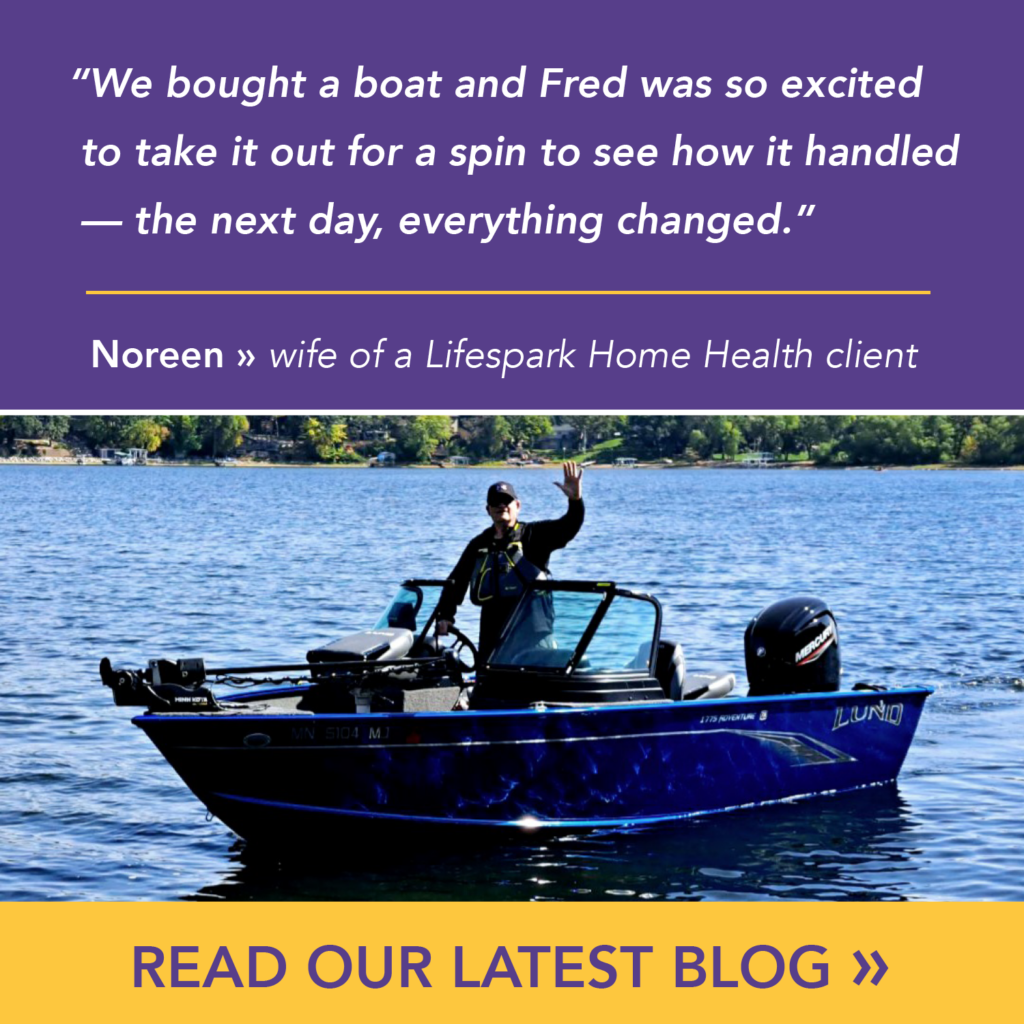
Fred and Noreen had spent the day doing things they loved—seeing live theater, eating dinner outside at a favorite restaurant, and going for an evening stroll. “It was just a beautiful, normal, perfect May day,” Noreen said.
The couple, who were married six years ago, enjoyed an active lifestyle that included concerts and plays, walking, hiking, dining out, and travel. Fred, 75, was an avid golfer who played on leagues in Minnesota and Florida where he and Noreen, 72, spent the winters. He also loved to fish. “We bought a boat late last fall, and Fred was so excited to take it out for a spin and see how it handled,” she said. “And the next day, everything changed.”
Early days
Noreen remembers waking up to a distress call coming from the bathroom. “Fred was yelling out my name and when I got there, he said, ‘Something’s really wrong—I think I’m having a stroke,’” she said.
She called 911 and within minutes, the paramedics arrived, along with the police and fire departments. They quickly determined that Fred was having a stroke and rushed him to the emergency room. After three weeks in the hospital, he was transferred to an acute rehab facility for two weeks of intensive therapy.
Join our PT team – we are hiring: Therapist – Lifespark
Nightmarish experience
Before Fred was discharged, Noreen contacted the home health agency recommended by the hospital for ongoing rehabilitation and nursing care to manage his feeding tube. But from the beginning, she and Fred were concerned about the quality of care. “The nurses just weren’t helpful, so I ended up doing most of the work myself, including hooking up and cleaning Fred’s feeding tube,” she said.
Within days, Fred started having symptoms of relapse, including severe muscle weakness and dizziness, and by the weekend, he could no longer walk. Knowing she couldn’t carry him to the bathroom, Noreen called the home health agency.
“They told me they’d send somebody out right away, but we kept waiting and every time I called them, they’d say someone was on their way,” Noreen said. “We waited almost six hours before a nurse finally showed up.”
The nurse wasn’t able to move him either but said she couldn’t make any decisions without first consulting Fred’s doctors. And since it was a Sunday, they would have to wait until Monday. Noreen was shocked.
“I asked her, ‘What am I supposed do with my husband until tomorrow? He’s in a chair in the living room and I can’t get him to the bathroom or into bed,’” Noreen said. “She told me to leave him there overnight and just put some towels under him.” By the time the nurse called back on Monday, Fred had been sitting in the chair for 27 hours. “It was an absolute nightmare,” Noreen said.
Advocating for her husband
Fred spent five days in the hospital and another week at a skilled nursing facility. Shortly before he was discharged, Noreen told her neighbor about their traumatic experience with the home health agency. “That’s how I found out about Lifespark and the wonderful people who took care of her husband when he was sick. And then she said, ‘Do not let the hospital talk you into using that other agency. You have the right to tell them who you want,’” Noreen said. “She also said to ask specifically for Kay for physical therapy and Laura for speech therapy—that everyone they worked with was really good, but those two were exceptional.”
Following her neighbor’s advice, she told the hospital referral coordinator that she wanted Lifespark Home Health and not the other agency. “I think she was surprised, but she made the call,” Noreen said.
Dream team
During Fred’s in-home evaluation, Noreen took her neighbor’s other piece of advice and asked for Kay and Laura by name. “Thank goodness, they were available,” Noreen said. “They were so kind and empathetic and they understood Fred’s goals.”
For the next nine weeks, Fred worked with physical therapist, Kay Hansen, PT, DPT, on balance, strength, and stability, and with speech-language pathologist, Laura Crocker, MA, CCC-SLP, on swallowing and vocal projection. “Kay and Laura saw how motivated he was to get his life back, so they were constantly figuring out new exercises and things to bring into the house to help him,” Noreen said. “They always went the extra mile.”
Noreen also had high praise for the full Lifespark team, especially the nurses. “During Fred’s second hospitalization, he learned that he had an arrythmia and needed to be on warfarin. But until the doctors could get him regulated, a nurse had to come twice a week to test his blood, run the samples over to the lab, and then call us back that same night to tell us the results and how much of the drug he should take,” Noreen said. “Those nurses were fantastic.”
Walking and balance
From the start, Kay, Fred’s physical therapist, had known how important it was to his mental health for him to get back in his boat, so she created a timeline with specific milestones to keep him motivated. After progressing him off the walker, she introduced exercises to improve his spatial awareness, higher-level balance, and reaction time—from walking on a foam pad to mimic uneven surfaces to holding still while she pushed against him. “I would tell him, ‘You know, Fred, the better you get, the tougher I can be,’ but he was all in,” she said.
After eight weeks, Kay decided he was ready to tackle his biggest goal. “I said, ‘Get up—we’re going out to the garage and you’re going to practice getting in and out of the boat,’” she said. According to Noreen, Fred’s face lit up like it was Christmas.
Eating and speaking
When Fred first began working with Laura, his speech therapist, he was newly off his gastrostomy tube and hadn’t eaten or drunk anything by mouth in more than two months. She taught him swallowing techniques to prevent aspiration, which allowed him to progress from thickened to pureed food, and eventually, to nearly all regular food, as long as he followed a few basic strategies. “Fred was able to really enjoy food again, not just at home but also at restaurants and family gatherings, and still feel safe,” Laura said, adding that this was one of his goals.
The stroke had also affected his voice, making it hard for Noreen to hear and understand him. To restore his vocal strength, Laura gave him exercises, like humming, sliding up and down the scale, vocalizing on different pitches, and even trying to get a server’s attention at a noisy restaurant. “Many people feel silly doing these exercises, but not Fred,” she said. “Noreen told me that she’d often hear him humming and making funny sounds without any sense of self-consciousness.”
According to Laura, speech therapy can take much longer to see improvements than other kinds of therapies. “That can be hard on clients, but Fred had what’s probably the most essential ingredient to progress: motivation,” she said. “It was also very important that Noreen was so supportive and eager to be part of his recovery.”
Gratitude
In September, Fred achieved his biggest goal to date. “A friend came over and helped me load up the boat, and for three hours, we drove that thing around the lake,” Fred said. “I think Noreen was a little nervous at first, but she was a great sport.”
The couple has expressed their deepest gratitude to Lifespark for Fred’s miraculous recovery, but Kay and Laura give all the credit to Fred and Noreen. “We offer our clients the tools, but it’s up to them to use them,” Kay said. “Fred was highly motivated and determined, and Noreen was his cheerleader and rock, and that makes all the difference in the world.”
To learn more about our Medicare-certified home health services, visit Lifespark Skilled Home Health.



